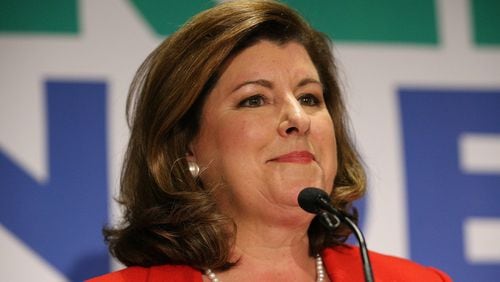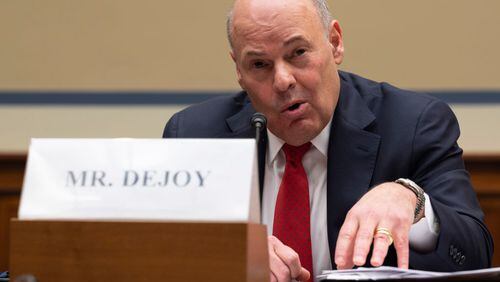Karen Handel's victorious path through Georgia's 6th Congressional District began in the outskirts of downtown Marietta and tore through the conservative stronghold of east Cobb County. It darted through her hometown of Roswell and into the affluent deep-red bastions of Milton and parts of Johns Creek.
Handel staved off what would have been an embarrassing upset by Democrat Jon Ossoff by consolidating the conservative vote and cutting his margins in north DeKalb County and Sandy Springs, where she sliced deeply into his margins from the last round of voting.
For all the national attention and record-setting spending in the race, Ossoff managed almost the exact vote total he notched in the April 18 special election, when he got 48 percent of the ballots cast. Some $50 million was spent on the race, a four-point victory by Handel that was wider than polls predicted.
And she overcame Ossoff’s vaunted ground game — a legion of volunteers and staffers who knocked on tenss of thousands of doors — with the help of Republican allies who drove voters to the polls long before Tuesday’s vote. Ossoff easily won the early vote in April; he only narrowly carried it in Tuesday’s runoff.
Handel racked up nearly 60 percent of the vote in conservative east Cobb and held Ossoff to less than 60 percent in DeKalb, the bluest part of the territory. She easily held Fulton County — the most populous area in the 6th — and slashed into precincts along the Ga. 400 corridor that Ossoff needed to win by big margins.
An eye-popping overall turnout of about 260,000 — far surpassing previous special elections — buoyed her campaign, partly because there are more conservatives in the district than liberals. The torrential rain that drenched parts of the district Tuesday didn’t seem to dampen voter participation.
‘Demonizing’
The GOP tide helped Handel compensate for campaign stumbles and controversies rocking President Donald Trump. Critics questioned her focus on her experience in public office at a time when being labeled a “career politician” — as Ossoff tried to brand her — could alienate GOP voters.
But her relentless attacks casting Ossoff as an out-of-district interloper backed by U.S. House Minority Leader Nancy Pelosi of California took root among some GOP voters. At polling precincts across the district, conservative voters expressed their disdain for the San Francisco Democrat.
“He doesn’t live in this area; he doesn’t really represent us,” said Eric Hunger of Sandy Springs. “Being a Republican, I think (Handel’s) ideas are well-founded and coordinate with my beliefs.”
Pollster Mark Rountree of Landmark Communications said pummeling Pelosi made a useful counter to Democrats “demonizing” Trump.
“Karen and the Republicans found someone they needed to demonize as well — Pelosi,” he said. “By the end of the campaign, people were tired of hearing Pelosi’s name over and over. But it resonated.”
During an interview Wednesday, Handel said her opponent’s out-of-district residency might have been the biggest factor in her victory. Ossoff lived south of the district, near where his fiancee attends medical school, although he planned to move north if he won.
“In the last month, Republicans suddenly started paying attention and more independents started breaking my way,” she said. “And the issue of his residency started permeating. It really did matter to people that they would have a congressman that was part of this district.”
Handel was aided by vast resources from outside GOP groups, including the Congressional Leadership Fund, a super PAC with ties to House Speaker Paul Ryan that spent more than $7 million to thwart Ossoff.
In the first round of voting, the group sent 100 staffers to crisscross the district to target 100,000 of the most likely Republican voters. The group shifted its strategy for the runoff phase, targeting two distinct blocs.
The first was an effort to mobilize 38,000 voters who had cast ballots in last year’s GOP presidential primary but not in April’s vote. The second was an appeal to about 100,000 “soft” Republicans — likely GOP voters who often skipped elections — to cast their ballots early.
“We were never going to match Ossoff on TV. Nor did we need to,” said Corry Bliss, the super PAC’s director. “We concluded that the best use of our dollars would be running a highly targeted ground game.”
‘Seismic shift’
Ossoff faced an uphill battle in the district, a suburban stretch drawn during redistricting to elect Republicans. Even if he wrung every vote he could out of Democrats in the area, he still needed to win over a sizable slice of independents and moderates who otherwise vote for Republicans but might be turned off by Trump.
In downplaying the loss, state and national Democrats pointed to the district's GOP-friendly boundaries. U.S. Rep. Ben Ray Lujan, the chairman of the Democratic Congressional Campaign Committee, said there are more than 70 congressional districts now held by Republicans in the U.S. that are more favorable to Democrats than the 6th District. Democratic Party of Georgia Chairman DuBose Porter blamed "gerrymandering."
“Make no mistake — there is a seismic shift on the horizon that will send shockwaves from the U.S. House to the courthouse,” Porter said.
Ossoff’s defeat will trigger a new round of soul-searching by Democrats who hoped his two-pronged message would give them a path to flip conservative-leaning suburban districts long held by Republicans. He touted himself to liberals early in the campaign as a “make Trump furious” candidate, but Ossoff rarely assailed the president as Tuesday’s vote neared.
He held back when Trump and Vice President Mike Pence trekked to Georgia to raise cash for Handel, saying only that he wasn’t concerned with the comings and goings of “Washington figures.” And he offered only mild criticism of the torrent of antagonizing tweets that Trump flung his way, saying that they were “misinformed.”
Within minutes of Ossoff’s defeat on Tuesday, progressives took aim at him for not more aggressively embracing liberal policies or more frequently targeting Trump. U.S. Rep. Seth Moulton, a Massachusetts Democrat, tweeted that the race “better be a wake up call for Democrats — business as usual isn’t working.”
They’ll have a chance to test a new message — and soon. Handel won just a short-term lease of the seat, and she’ll have to defend it in next year’s midterms. Ossoff has yet to decide whether he’ll run again, and Republicans warn already that open antagonism of Trump in the district won’t work.
“The Never Trumpers and the resistance movement have been beaten to a pulp time and again,” said Dan McLagan, a GOP strategist and one-time Handel aide. “And only the clinically insane would keep trying this game plan. So I expect that’s exactly what the left will do.”
GOVERNMENT AND POLITICAL NEWS
If it happens in Washington or under the Gold Dome — or somewhere else — and it affects Georgians, The Atlanta Journal-Constitution has somebody there to tell you what it means. Follow our coverage at http://www.myAJC.com/politics.
You can also join the conversation on Twitter at http://Twitter.com/GAPoliticsNews or Facebook at http://facebook.com/gapoliticsnewsnow/.








